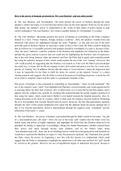How is the power of humans presented in ‘My Last Duchess’ and one other poem?
In ‘My Last Duchess’ and ‘Ozymandias’ The poets present the power of humans through the main
speaker's control and name; it is clear that they believe they are the most superior. However, by the end of
both poems, the speaker's power is undermined as the victim of their abuse of power begins to gain
control, although in ‘My Last Duchess’, the victim is another human; in ‘Ozymandias’ it is nature.
In ‘My Last Duchess’, Browning presents the power of humans as controlling as the Duke compares
himself to a God: “Notice Neptune, though, taming a seahorse”. Here, the speaker’s boastful tone and
obsession with power are highlighted through the noun “Neptune”, as this god was one of the most
powerful gods in Roman religion; by showing a statue of him to the Count, the Duke could be implying
that he believes he is incredibly powerful and perhaps should be worshipped, as a god is, because of this.
Also, the noun “seahorse” could be symbolic of the Duchess and emphasise her inferiority to the Duke;
perhaps this great contrast in power and size could also be highlighting the Duchess’ lack of experience,
due to her only being fourteen when she married, and how the Duke had to guide and eventually punish
her using his authority because of this, which could explain the use of the verb “taming”. However, this
verb could possibly be suggesting that the Duchess was treated as if she were the Duke’s pet and despite
her small size, it seems that he did not manage to have full control and power over her- he is only in the
process of “taming” her. In addition, the fact that this statue is “cast in bronze” creates the impression that
it may be impossible for the Duke to fulfil his desire for control, as the material “bronze” is a rather
starring material and suggests that the Duke is stuck in the process of building his power; it seems he will
never achieve complete control and the statue is a permanent reminder of this.
The power of humans is also presented as controlling in ‘Ozymandias’: “sneer of cold command”. The
use of the negative noun “sneer” here highlights the Pharoah’s cruel personality and could suggest that he
is mocking others for their lack of power; this is rather ironic as it is clear that he had little impact, and it
appears that the sculptor may actually be mocking him instead through his greatly negative portrayal of
him using the statue, which could mirror Shelley’s own hatred towards the English monarchy. Also, by
writing this poem in the form of a sonnet, which is often used for romance, the poet could be illustrating
the love Ozymandias Felt towards himself and his power. However, the fact that punctuation regularly
disrupts the flow of this sonnet emphasises how many felt the opposite about his power; perhaps this is
due to his forceful personality, which is demonstrated through the negative noun “command” and the
alliteration of the harsh ‘c’ sound.
In ‘My Last Duchess’, the power of humans is presented through the Duke’s pride for his name: “my gift
of a nine-hundred-years old name”. Here, the use of the noun “gift” implies that the Duke views his
family name and power as highly important, and highlights his belief that the Duchess deserved to be
punished for failing to appreciate it accordingly; during the Italian Renaissance, families passed down
their power and name through having male children, and by the Duke's name being
“nine-hundred-years-old”, there can be no doubting that he would have had great power and therefore he
would have expected the Duchess to respect it. Also, the possessive pronoun “my” illustrates how greatly
the Duke values his power; by beginning a new line with this lexeme it is emphasised, which could
suggest that the Duke is attempting to highlight his superiority to all other men and how his “gift” should
be viewed as the greatest. However, the use of enjambment begins to undermine this power, because it




